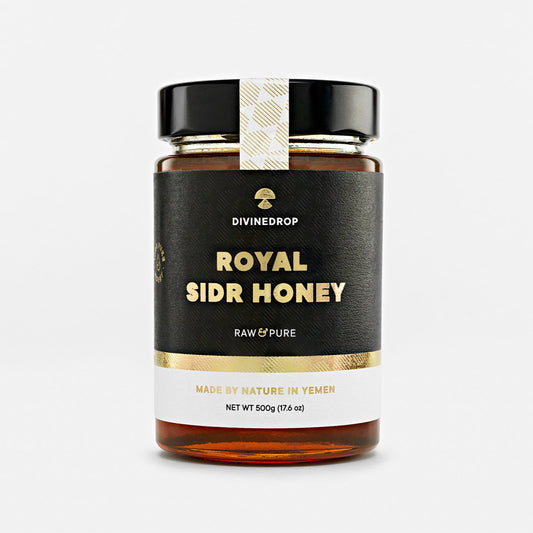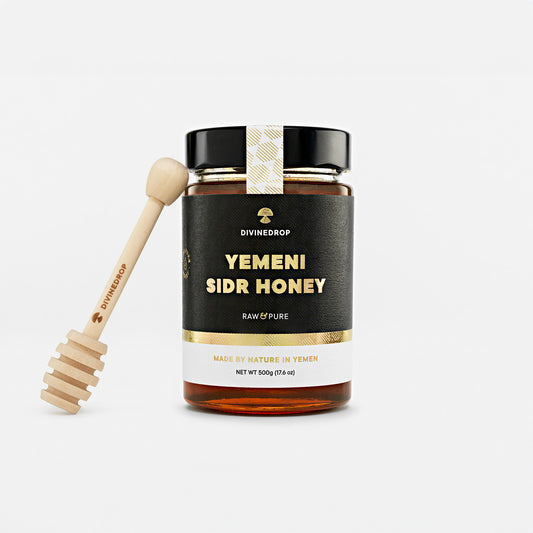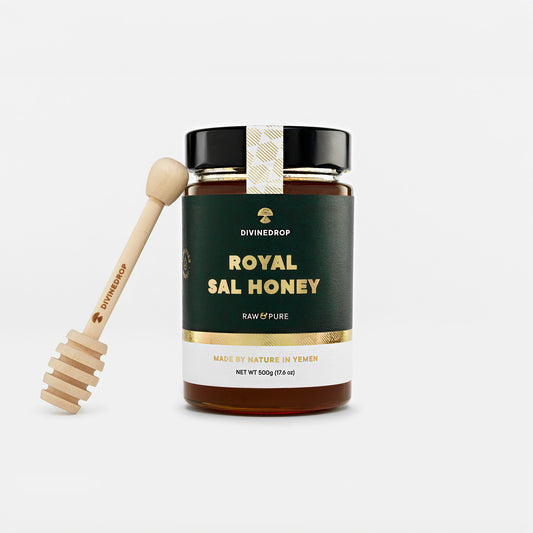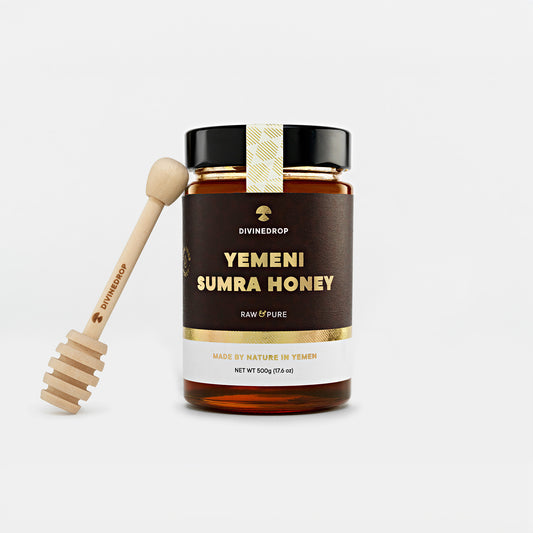Introduction: In the world of natural remedies, two distinct types of honey have emerged as true superfoods: Sidr honey and Manuka honey. These golden elixirs, renowned for their unique characteristics and medicinal properties, stand apart from other raw honeys. But what makes them so special? Are they alike in their healing prowess, or do they each possess their own remarkable qualities? In this blog, we'll delve into the captivating stories of DivineDrop Sidr Yemeni Honey and Manuka Honey, supported by extensive academic research and laboratory findings.
The Geographical Background:
DivineDrop Sidr Yemeni Honey: Produced from the nectar of the Sidr tree, scientifically known as Ziziphus Spina-Christi, this honey has deep-rooted significance. The Sidr tree holds religious importance, mentioned in the Quran and believed to have played a role in the Bible. Locally, it has been used for centuries to heal wounds, soothe stomachaches, treat skin issues, and address various health concerns. The most sought-after Sidr honey is crafted in the pristine landscapes of Yemen, Oman, and South Saudi Arabia.
Manuka Honey: Manuka honey, on the other hand, hails from the nectar of the tea tree, Leptospermum Scoparium, primarily found in Australia and New Zealand. Among these, New Zealand is celebrated for producing the most esteemed Manuka honey. The Maori people have long recognized the antiseptic and antibacterial properties of the Leptospermum Scoparium plant.
Characteristics:
DivineDrop Sidr Yemeni Honey: Sidr honey is renowned for its thick, luscious texture and a taste that dances on the palate with rich, buttery sweetness. It boasts a golden hue that matures into a dark, reddish shade over time.
Manuka Honey: Manuka honey is distinctive in its own right. With a slightly bitter taste and a more solid consistency compared to traditional honeys, it stands apart as a unique honey variety.
Medicinal Properties:
DivineDrop Sidr Yemeni Honey and Manuka Honey: Both Sidr honey and Manuka honey are acclaimed for their shared medicinal properties, including potent antioxidant, antibacterial, and anti-inflammatory effects.
Antibacterial Properties of Both Sidr and Manuka Honey: A study conducted by researchers at the University of Ottawa examined the antibacterial activities of Sidr and Manuka honey. Honey, hailed as an antibiotic with no long-term side effects, was pitted against commonly used chemical antibacterial medicines. The results were remarkable. Both Yemeni Sidr honey and Manuka honey demonstrated 100% effectiveness in killing various bacteria strains, including MSSA, MRSA, and PA. Notably, they showed their prowess in combating biofilms, which are highly resistant to antibiotics.
Antioxidant and Anti-inflammatory Properties:
DivineDrop Sidr Yemeni Honey: A study from King Saud University in 2013 explored the protective effects of Sidr honey on oxidative stress and organ damage in rats. The results were promising, indicating that Sidr honey protected the liver and kidneys from damage and exhibited strong antioxidant activity.
Another study published in the World Academy of Science, Engineering, and Technology in 2011 showcased Yemeni Sidr honey's anti-inflammatory properties. When applied to rats, it displayed significant inhibition of inflammation mediators, including histamine, serotonin, bradykinin, and prostaglandin.
Manuka Honey: In 2017, a study delved into the antioxidant and anti-inflammatory properties of Manuka honey. The findings revealed its efficacy in treating chronic ulcers and preserving mucosal glycoproteins. This was attributed to Manuka honey's potent antioxidant and anti-inflammatory qualities.
In essence, both Sidr honey and Manuka honey have shown promise in healing wounds and addressing various ailments, such as sore throats, coughs, gastrointestinal issues, and flu. They may also boost immunity, enhance energy levels, and aid in memory retention. However, it's essential to note that their use in medical contexts should be carried out with careful consideration and adherence to recommended procedures.
Proper Consumption: Both Sidr honey and Manuka honey offer a myriad of potential health benefits when consumed appropriately. Some suggested uses include:
- Taking a spoonful before bedtime to support gastrointestinal health.
- Mixing with water to relieve nasal congestion.
- Consuming a teaspoon daily to address diarrhea and other digestive issues.
- Preparing a bedtime concoction with milk for improved sleep.
- Using as a gargle solution to soothe sore throats and mouth sores.
- Incorporating into the daily routine to help manage blood sugar levels in diabetics or those at risk.
- As with any natural remedy, it's advisable to consult with a healthcare professional for personalized guidance, especially for individuals with specific health concerns.
The Story of Yemeni Sidr Honey: Yemeni Sidr honey carries a poignant narrative. Yemen has faced grave challenges due to ongoing armed conflict, resulting in widespread devastation. However, Yemeni people have found hope and purpose in the Sidr honey industry. Local beekeepers, driven by their love for their craft, are not only producing high-quality honey but also revitalizing Yemen's rich legacy, once known as "Arabia Felix." Their resilience is a testament to the power of honey to bring positive change and hope to a war-torn land.
Side Effects: When consumed in recommended doses, both Sidr honey and Manuka honey are generally safe. Common side effects, such as stomach upset, are rare. Allergic reactions, typically manifested as rashes, may occur in some individuals. It's important to note that raw honey is not advised for children under 12, and individuals with diabetes should consult their healthcare providers before incorporating honey into their diet.
Conclusion: Sidr honey and Manuka honey share remarkable medicinal properties, supported by extensive scientific research. However, they are distinct in flavor, source, and cultural significance. Yemeni Sidr honey, with its unique and smooth taste, also plays a pivotal role in the resurgence of Yemen amidst adversity. While these honeys offer a plethora of health benefits, they should be used thoughtfully and with respect for their potency.
Resources:
- https://www.hindawi.com/journals/ecam/2013/569037
- https://www.webmd.com/cold-and-flu/news/20080922/humble-honey-kills-bacteria
- https://pubmed.ncbi.nlm.nih.gov/28250794/
- https://pubmed.ncbi.nlm.nih.gov/18688794/
- http://healthywithhoney.com/wp-content/uploads/2015/01/Investigation-of-Anti-Inflammatory-Antipyretic-and-Analgesic-Effect-of-Yemeni-Sidr-Honey.pdf
- https://researchcommons.waikato.ac.nz/bitstream/handle/10289/5696/thesis.pdf?sequence=3
- https://onlinelibrary.wiley.com/doi/10.1002/jsfa.1952
- https://www.hindawi.com/journals/ijbm/2019/6132581/
- sidrhoney.tripod.com/id12.html;
- www.hindawi.com/journals/ecam/2013/569037/;
- www.islamicbookstore.com/a6060.html



